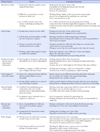Abstract
Purpose
The purpose of this study was to describe the essential structure of the lived experience of working mothers' parenting burden in Korea.
Methods
Eight working mothers with young children were interviewed. The Colaizzi analysis of phenomenological research was applied.
Figures and Tables
References
1. Bang KS. Childrearing attitude and burden of employed and unemployed mothers and temperament and health related variables of their preschool children. Korean J Child Health Nurs. 2004; 10:217–224.
2. Colaizzi PF. Psychological research as the phenomenologist views. it. In : Valle R, King M, editors. Existential phenomenological alternatives for psychology. New York, NY: Oxford University Press;1978. p. 48–71.
3. Han KJ. The study on the maternal burden of caretaking, the support and educational need for the caretaking activities of the infants' mother. Korean J Child Health Nurs. 1997; 3:228–240.
4. Hill EJ, Hawkins AJ, Ferris M, Weitzman M. Finding an extra day a week: The positive influence of perceived job flexibility on work and family life balance. Fam Relat. 2001; 50:49–58. http://dx.doi.org/10.1111/j.1741-3729.2001.00049.x.

5. Jeong BS. A study on working mother and non-working mother's upbringing attitude and influence of their children's emotion and social maturity. Incheon: Inha University;2005. Unpublished master's thesis.
6. Kim EJ, Seo YH. A qualitative study on child-rearing by grandparents. Korean J Child Stud. 2007; 28:175–192.
7. Kim EJ, Seo YH. A study on child rearing experience of stay-at-home mom with infants. Early Child Educ Care. 2012; 7:93–114.
8. Kim KE, Chang YJ. A hermeneutics phenomenological study on working mothers' experiences of rearing their firstborns. Qual Res. 2008; 9:31–43.
9. Kim MK, Seo DH. A comparative study on formation of gender policy and transition of government role in Korea, Britain and Sweden - perspectives of feminism. Korean Public Adm Rev. 2004; 38:349–370.
10. Kim SY, Kim SM, Lee KY. A qualitative study on dual earner families' work and family lives for ideal work-family balance. Korea Fam Resour Manage Assoc. 2011; 15:93–116.
11. Ko JS. The relationships between the parenting-burden, depression and self-esteem of mothers of the child with disabilities. J Spec Educ:Theory Pract. 2008; 9:1–17.
12. Korea Institute of Child Care and Education. The Basic Analysis Report of Korean Children Panel Survey 2010. 2011. 12. Retrieved December 10, 2012. from http://www.kicce.re.kr/kor/publication/02_03.jsp?mode=view&idx=3524&startPage=0&listNo=0&code=&search_item=&search_order=한국아동패널&order_list=10&listScale=5&view_level=0.
13. Lee JY. An analysis of psychological stress of working married women in child care. Seoul: Kookmin University;2008. Unpublished master's thesis.
14. Lee KY, Park IS, So HY. Parenting experience of parents with a disabled child. Korean J Rehabil Nurs. 2008; 11:32–40.
15. Lee MK. A discourse on education: An analysis of the attitude of middle-class Korean mothers on the education of their children. Korean J Sociol Educ. 2007; 17:159–181.
16. Lincoln YS, Guba EG. Inquiry. Beverly Hills, CA: Sage Publications;1985.
17. Ministry of Health & Welfare. A study on a public awareness related to low fertility and population aging in Korea. 2011. 11. Retrieved December 25, 2012. from http://www.mw.go.kr/front_new/jb/sjb030301vw.jsp?PAR_MENU_ID=03&MENU_ID=030502&CONT_SEQ=267427&page=1.
18. Mishina H, Takayama JI, Aizawa S, Tsuchida N, Sugama S. Maternal childrearing anxiety reflects childrearing burden and quality of life. Pediatr Int. 2012; 54:504–509. http://dx.doi.org/10.1111/j.1442-200X.2012.03577.x.

19. Park GJ. A study on the effect of work family compatibility support policy on child foster burden and childbirth attitude. Seoul: Myongji University;2008. Unpublished doctoral thesis.
20. Shin YH, Kim TI, Kim HS, Shim MK, Lee HJ, Hong MR. Pediatric nursing. Paju: Yangseowon;2009.
21. Song YM, Lee JS. Investigation of the causes of low birth-rate: Focused on the change in industrial society and the expansion of the opportunity of women for social activities. Health Soc Welf Rev. 2011; 31:27–61.
22. Statistics Korea. The economically Active Population Survey. 2011. 04. Retrieved July 21, 2012. from http://www.index.go.kr/egams/stts/jsp/potal/stts/PO_STTS_IdxMain.jsp?idx_cd=1572.
23. Sung JW, Park SY. Maternal guilt and its related variables: Focusing on mother's employment status and childage. Korean J Child Educ Care. 2011; 11:123–145.
24. Yang SN. Strategies for balancing work and family: The experiences of full-time working mothers. Korean J Fam Ther. 2011; 19:103–126.
25. Yang SN, Shin CS. Work-family conflicts: Challenges of working mothers with young children. Health Soc Welf Rev. 2011; 31(3):70–103.
26. Yoo GS. Work-family balance policies responding to low fertility. Korean J Psychol Soc Issues. 2012; 18:111–125.
27. Yoo IY, Kim DH. Mothers experiences of parenting of a child with atopic dermatitis. J Korean Soc Matern Child Health. 2006; 10:169–179.




 PDF
PDF ePub
ePub Citation
Citation Print
Print




 XML Download
XML Download